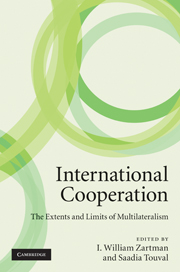Book contents
- Frontmatter
- Contents
- List of figures
- List of tables
- List of contributors
- Acknowledgements
- 1 Introduction: return to the theories of cooperation
- Part 1 Multilateral meanings of cooperation
- Part 2 Multiple strategies of cooperation
- 6 Synthesizing rationalist and constructivist perspectives on negotiated cooperation
- 7 The shadow of the past over conflict and cooperation
- 8 Chicken dilemmas: crossing the road to cooperation
- 9 Conflict management as cooperation
- 10 Status concerns and multilateral cooperation
- 11 Asymmetrical cooperation in economic assistance
- 12 Conclusion: improving knowledge of cooperation
- Bibliography
- Index
12 - Conclusion: improving knowledge of cooperation
Published online by Cambridge University Press: 05 June 2012
- Frontmatter
- Contents
- List of figures
- List of tables
- List of contributors
- Acknowledgements
- 1 Introduction: return to the theories of cooperation
- Part 1 Multilateral meanings of cooperation
- Part 2 Multiple strategies of cooperation
- 6 Synthesizing rationalist and constructivist perspectives on negotiated cooperation
- 7 The shadow of the past over conflict and cooperation
- 8 Chicken dilemmas: crossing the road to cooperation
- 9 Conflict management as cooperation
- 10 Status concerns and multilateral cooperation
- 11 Asymmetrical cooperation in economic assistance
- 12 Conclusion: improving knowledge of cooperation
- Bibliography
- Index
Summary
We seem to be living in an era of elusive cooperation after the Cold War, not exactly unilateralism but still a pervasive tendency to grasp for policies that depend on one or few actors (Zartman 2009). Of course, the George W. Bush administration – now past – is often cited as the prime example, and although in reality its single-shooting was more a matter of aggressive packaging during the first administration than effective action, it had a real predilection for small groups, such as the six-power talks on Korea or the quartet on Israel or the G4+1 on Iran. But other leading states in the early twenty-first century have followed a policy of limited cooperation or minilateralism. Russia has embarked on a single-handed revival of Cold War attitudes, with the Shanghai Cooperation Organization as company; the major powers of Asia – China, Japan, and India – focus on their own position and policy rather than on broad cooperative ventures; Iran and North Korea, too, have sought security in unilateral nuclear action; and Venezuela embarked on an attitude of sticking it to its Big Brother in the hemisphere, picking up a few friends along the way. Only Europe in its Union suit has adopted an official policy of cooperation, but it, too, is not only ragged but operating inward within a limited group.
- Type
- Chapter
- Information
- International CooperationThe Extents and Limits of Multilateralism, pp. 227 - 237Publisher: Cambridge University PressPrint publication year: 2010
- 1
- Cited by



